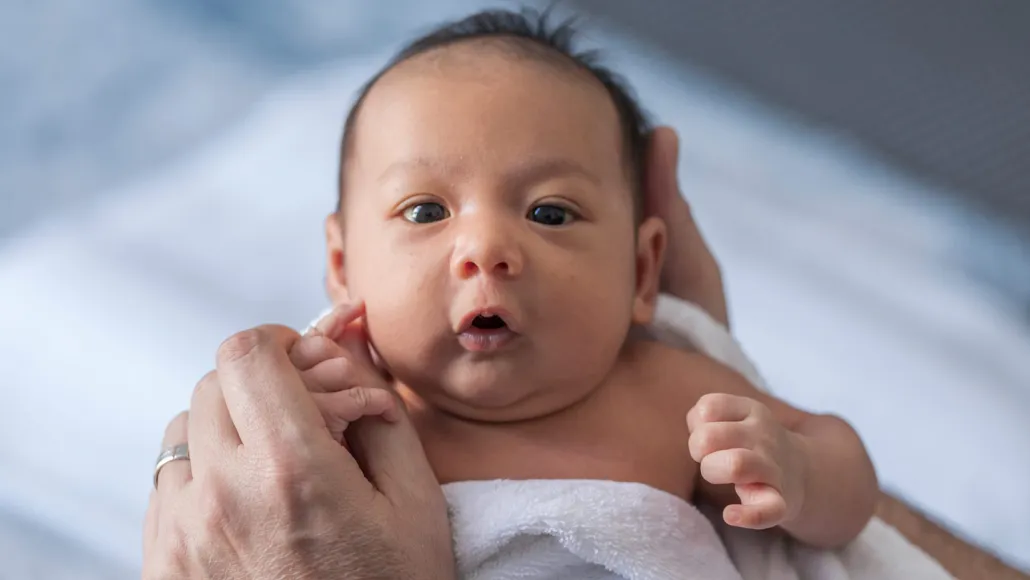Many U.S. babies may lack gut bacteria that train their immune systems
Missing the microbes is linked to a higher risk of allergies and other health issues

Many babies born in the United States lack important gut microbes that digest breast milk and help train the immune system.
Vicki Smith/Getty Images
About three quarters of babies born in the United States may not have enough friendly microbes in their guts to protect against developing allergies, asthma and eczema, a new study suggests.
In a large study of more than 400 babies, 24 percent had no detectable levels of Bifidobacterium, gut microbes that digest sugars in breast milk, researchers report June 24 in Communications Biology. “Nondetectable levels of the most fundamental family type of bacteria for the infant was really surprising to us,” says Stephanie Culler, cofounder and chief executive of Persephone Biosciences, the San Diego–based company that conducted the study. “It was just not there.”
The result also surprised microbiologist Jack Gilbert of the University of California, San Diego, but for different reasons. Extrapolating from previous studies, “I was expecting more like 50 or 60 percent of infants to not have any detectable Bifidobacterium in their in their stool,” he says. The finding is “maybe more reassuring than my prior estimates, but it’s still quite depressing.”
Those gut microbes help train the immune system. Without them, children are prone to allergic conditions, Culler and colleagues found. Babies who had low levels of Bifidobacterium were at least three times as likely to develop allergies, eczema and asthma by the time they were 2 years old than babies with expected levels of those bacteria, the researchers found.
Babies who took antibiotics had 3.3 times the risk of developing allergic conditions than those that didn’t need the drugs. Antibiotics are one reason Bifidobacterium species are disappearing from infant guts, Culler says.
Changes in dietary habits toward processed foods and away from fermented foods, use of antibacterial soaps and other changes have also reduced the amount of Bifidobacterium in the environment, both Culler and Gilbert say. “Over three to four generations, we’ve started to see this organism being eradicated from the maternal population, and hence it would not be available to colonize the child,” Gilbert says.
Previously, low levels of Bifidobacterium were linked to childhood obesity and other health problems. Other microbe imbalances have also been associated with allergies and asthma.
About 76 percent of infants in the study had low or undetectable levels of Bifidobacterium. One historically dominant species called B. infantis was missing from 92 percent of samples.
Children born by C-section were more likely to have low or missing levels of Bifidobacterium. But even some vaginally born, breastfed babies had low levels of the gut microbes. And breastfeeding didn’t restore Bifidobacterium in babies born by C-section. Instead, the lack of Bifidobacterium allowed some potentially harmful bacteria to thrive. The long-term consequences of replacing Bifidobacterium with potentially infectious bacteria aren’t yet known. The study will track the children’s health for seven years.
Persephone Biosciences is testing whether a product containing Bifidobacterium, human milk sugars and vitamin D can raise levels of the bacteria in infants. Results of that trial are expected later this year.
Many trials have suggested that probiotics reduce the risk of developing inflammatory diseases, including asthma and rashes like eczema, Gilbert says. But the U.S. Food and Drug Administration has warned against probiotics for premature babies after one preterm baby died in 2023. It is not certain that B. infantis in the probiotic caused the baby’s death, and “hundreds of thousands of people are using this as probiotic every day with no instances of infection,” Gilbert says. He adds that there is “probably no risk and quite a lot of potential benefit” for pregnant and lactating people to take Bifidobacterium probiotics to help transfer the organisms to their babies.







